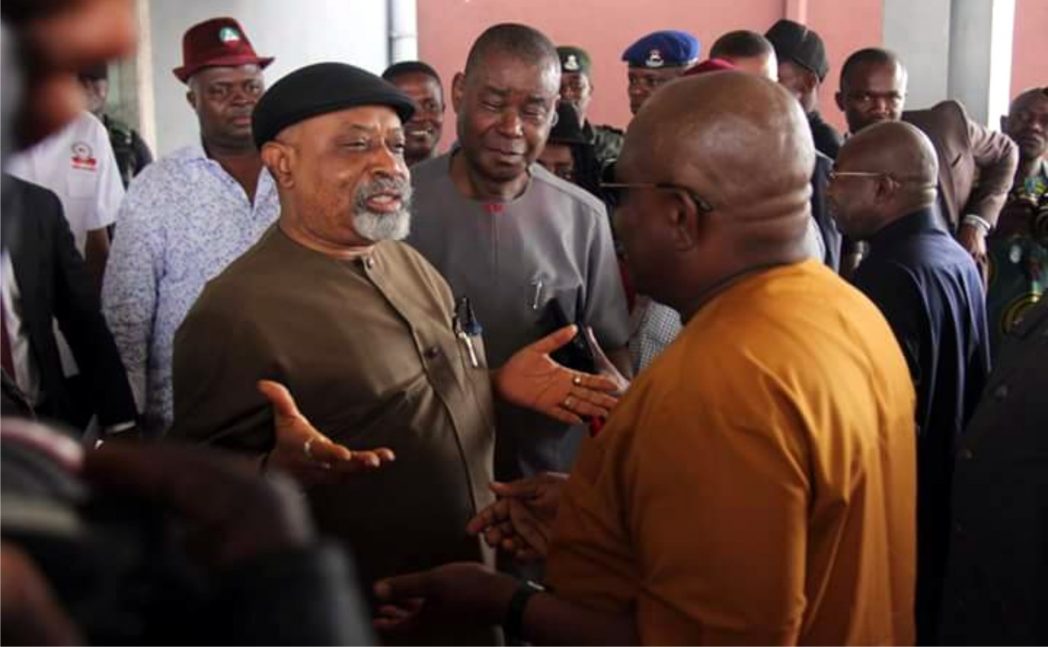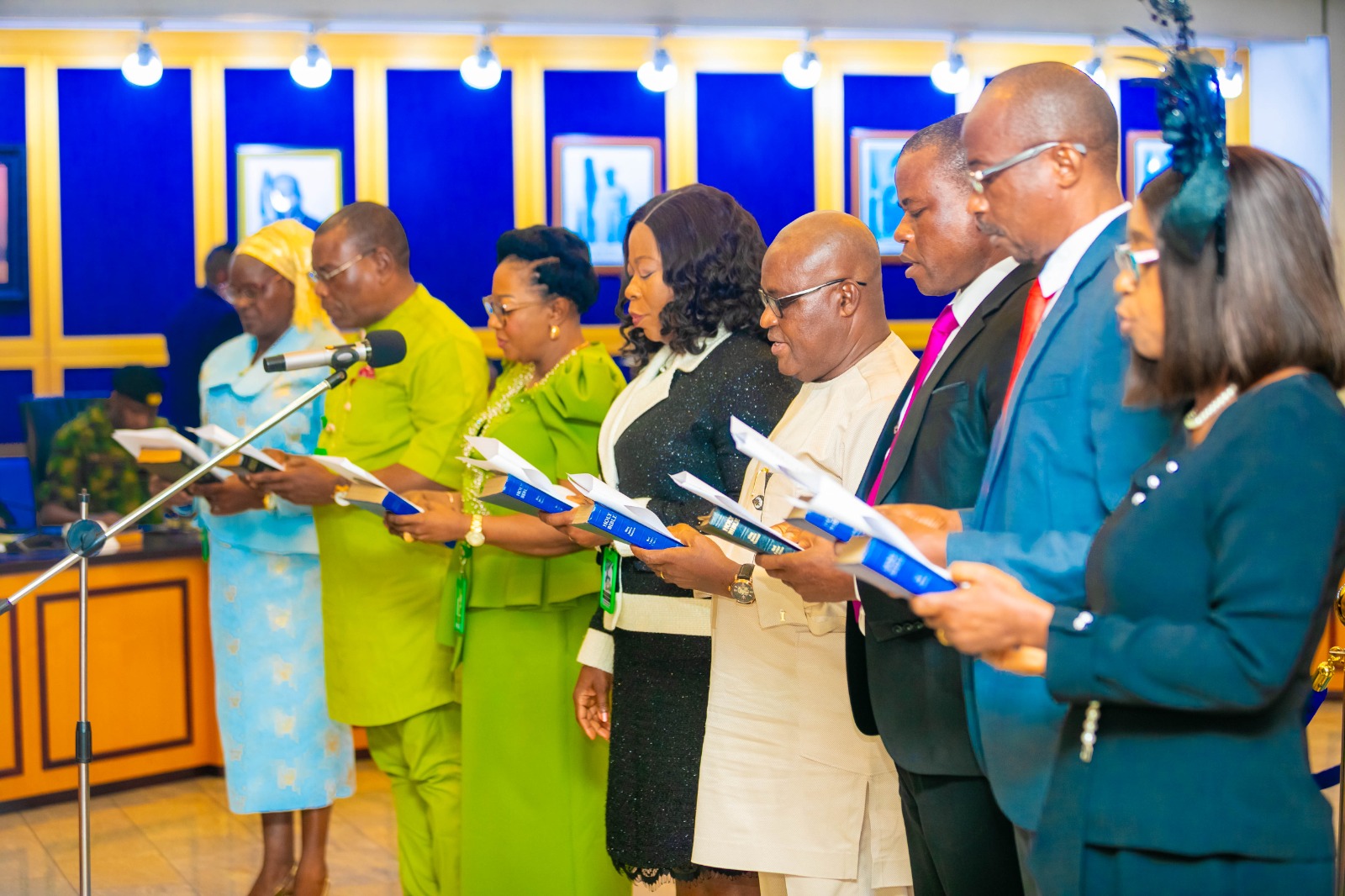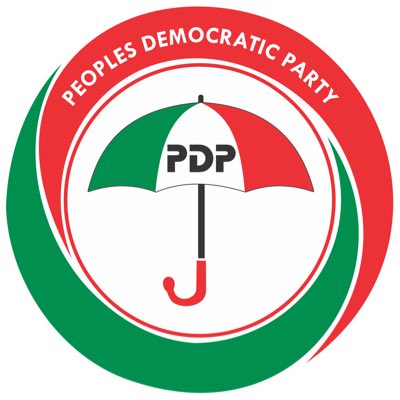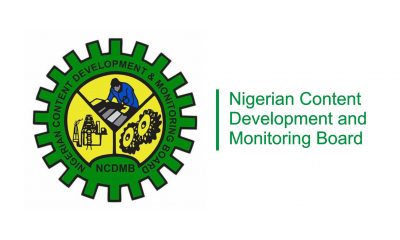News
Wike Canvasses Minimum Wage On States’ Ability To Pay

The Rivers State Governor, Chief Nyesom Wike has stated that Nigerian workers would be better off when states are allowed to fix their separate minimum wages in line with their financial capacity to pay.
Speaking during a public hearing on the new national minimum wage for Nigerian workers for the South-South geo-political zone in Port Harcourt, last Friday, Wike said that states vary in financial capacity, thereby making a uniform minimum wage unrealistic.
The governor said: “And for us, therefore, the single national minimum wage system is yet another lie that betrays the distortions in our federation and the structured dislocation of the states in the power equation between the Federal Government and the federating states.
“It is our view that the country and its workers would be better off, if states are allowed to fix and pay their own minimum wages indexed to the prevailing cost of living and ability to pay.
“When this happens, it is possible that some states may go beyond the minimum threshold to pay a living wage, which is what our workers truly need”, he argued.
Wike said that the previous review exercise failed to give maximum weight to the existing disparity in economic potential and capabilities among the 36 states of the federation, adding that it has been difficult for most of the states to implement the existing N18, 000.00 minimum wage.
He noted that majority of the states were within the fringes of financial viability, and cannot meet their salary obligations to civil servants without bailouts from the Federal Government.
The governor said that enhanced wages can only be possible when the Federal Government improves the economy of the federation.
He said: “Here in Rivers State, we value our workers; we invest in their welfare in different ways, and we want them to earn living wages that can keep them and their families as comfortable as possible.
“The Rivers State Government, therefore, supports the ongoing consultations by the Tripartite Committee on National Minimum Wage for arriving at a new national minimum wage floor for the country.”
In his contribution, Gov. Emmanuel Udom of Akwa Ibom called for a review of the revenue sharing formula.
Represented by the state Head of Service (HOS), Mrs Ekerebong Akpan, the governor said the present minimum wage was not adequate for today’s workers.
“Today, workers’ wage cannot take them home. There is the need to note what each state can pay.” he said.
According to Udom, government would be able to “absolve” the difference between the present N18, 000 minimum wage and the proposed N66, 500.
He said that the Federal Government could increase workers’ salary without publicity, adding that it could be done without announcing it.
In his opening remarks, the Minister of Labour and Productivity, Dr Chris Ngige said the exercise has been held across the six geo-political zones to ascertain the needs of Nigerian workers and employers to reach an acceptable and implementable wage.
The minister said: “It is hoped that at the end of the exercise, we will be able to have women and men who will be engaged in productive work in equitable conditions of freedom to associate and bargain collectively with equality and human dignity”.
Ngige, who is also the chairman of Tripartite Committee on National Minimum Wage, said the aim was to ensure that the nation adopts a national minimum wage that would assure the attainment of social protection floor for Nigerian citizens.
“The Federal Government wants a minimum wage that could secure goods (food) and services for Nigerian workers.
“At the end of the public hearing, we will collate contributions and arrive at an acceptable wage for Nigerian workers,” Ngige said.
Presenting the position of Nigerian Labour Congress in the South-South, Comrade Beatrice Itubo called for a living wage for workers, emphasising that the organised labour in Rivers State was insisting on N66,500 as national minimum wage for the workers in the country.
Itubo argued that the existing N18, 000 minimum wage was of no economic significance in the present economic situation.
“It is not a take home because of deductions, among others tax,’’ Itubo added.
Also speaking, the Rivers State Chairman of Trade Union Congress (TUC), Comrade Austine Jonathan, said the proposed N66, 500 was not “a take home due to deductions – tax, and compulsory pension contributions.
Jonathan, who represented the TUC in the South-South, noted that part of the proposed N66, 500 would go to healthcare, saying the menacing black soot was killing Rivers workers (residents).
He pleaded that pensioners should be considered in the new wage regime, arguing that some pensioners received below N10, 000 per month.
Both labour leaders also demanded upward review of workers’ salary every five years as well as building of social infrastructure to check high cost of living.
The public hearing attracted the representatives of the governors of Bayelsa, Cross River, Akwa Ibom, Edo and Delta states.
Also present at the meeting were labour leaders from the six states of the geo-political zone.
News
Ibas Inaugurates RSIEC, Service Commissions, Healthcare Board In Rivers …Charges Appointees To Embrace Principles Of Service

The Administrator of Rivers State, Vice Admiral (Rtd) Ibok-Ete Ibas, has charged newly appointed Board members to uphold the highest standards of discipline, competence, integrity, and unwavering dedication in their service to the State.
He emphasized that such commitment is critical to stabilizing governance, restoring democratic institutions, and advancing the principles of good governance in the State.
This was contained in a statement by the Administrator’s Senior Special Adviser on Media, Hector Igbikiowubo on Monday.
Ibas issued the charge on Monday while inaugurating the reconstituted Rivers State Independent Electoral Commission (RSIEC), Rivers State Civil Service Commission, Rivers State Local Government Service Commission, and the Rivers State Primary Health Care Management Board at Government House, Port Harcourt.
The Administrator urged the new appointees to embrace their roles with diligence, patriotism, and a commitment to transforming Rivers State through excellent service.
Addressing the Chairman and members of RSIEC, Ibas underscored their pivotal role in ensuring credible local government elections that reflect the will of the people.
“Your task is clear but demanding: to conduct free, fair, transparent, and credible elections at the grassroots level. You must resist bias, favoritism, and external interference while restoring public confidence in the electoral process,” he stated.
“The independence of your actions is crucial to sustaining peace, stability, and grassroots governance. I urge you to act with fairness, impartiality, and professionalism—even in the face of difficult choices,” Ibas added.
The Sole Administrator also charged the Rivers State Civil Service Commission on the need to eliminate mediocrity and foster a culture of excellence through merit-based recruitment, training, and promotions.
“The civil service must transition from favoritism to competence, integrity, and accountability. Your commission will lead reforms, including digital transformation and standardized practices across ministries, departments, and agencies,” he said.
He disclosed that extensive training programmes are underway, with a committee set up to overhaul the public service framework for greater efficiency.
Meanwhile, Ibas urged the Rivers State Local Government Service Commission to ensure professionalism and discipline in local government administration.
“As the closest tier of government to the people, you must drive reforms that insulate the system from politics and mediocrity. Your mandate includes merit-based recruitment, training, and enforcing standards for effective service delivery,” he stated.
In the same vein, the Administrator charged the Rivers State Primary Health Care Management Board with revitalizing healthcare delivery across the state’s 23 local government areas.
“Primary healthcare is the foundation of a sustainable health system. Your board must ensure facilities are adequately staffed, equipped, and operational focusing on maternal health, immunization, malaria control, and community health services,” he said.
He emphasized data-driven operations, incentives for rural health workers, and restoring the referral system to improve healthcare access.
He also assured the Board of sustained government support, including funding, for the effective discharge of their mandates but warned that board members would be held accountable for their performance.
The newly inaugurated members include: RSIEC: Dr. Michael Ekpai Odey (Chairman) with Prof. Arthur Nwafor, Prof. Joyce Akaninwor, and others as members.
Civil Service Commission: Dr. Livinus Bariki (Chairman), Amb. Lot Egopija, Mrs. Maeve Bestman, and others.
Local Govt. Service Commission: Mr. Isreal Amadi (Chairman), Rear Adm. Emmanuel Ofik (Rtd), Dr. Tonye Pepple, and others.
Primary Health Care Board: Dr. Dawari George (Chairman), Dr. Chituru Adiele (Executive Director), Prof. Kaladada Korubo, and representatives from key ministries.
News
Rivers PDP Debunks Sale Of LGA Election Forms

The Publicity Secretary of the Peoples Democratic Party (PDP) in Rivers State, Dr. Kenneth Yowika, has debunked claims that the party has commenced sale of forms for chairmanship and councillorship elections across the 23 local government areas of the state.
Yowika made the rebuttal in a statement made available to newsmen on Wednesday, describing the publication on the social media as baseless and untrue.
He urged members of the PDP to disregard the claim, saying that official communication regarding the sale of forms would be disclosed through the appropriate channels.
“With reference to information trending on social media, it has been falsely claimed that the sale of forms for Chairmanship and Councillorship elections in the 23 Local Government Areas (LGAs) of Rivers State will begin soon.
“However, the party has firmly denied these rumours, stating that they are baseless and untrue.
“The party has its own established methods of reaching out to its numerous supporters.
“The People’s Democratic Party, a law-abiding organisation, will patiently await the release of guidelines from the recently inaugurated Rivers State Independent Electoral Commission (RSIEC) before considering any sale of election forms.
“The PDP is urging its members to remain calm as official communication regarding the sale of forms will be disclosed through appropriate channels,” the statement read.
Enoch Epelle
News
South-South contributes N34trn to Nigeria’s economy in 2024 – Institute
Prof. Pius Olanrewaju, President of the Chartered Institute of Bankers of Nigeria (CIBN), has stated that the South-South region contributes N34 trillion to country’s economy in 2024.
He made the remark at the South-South Zonal Banking and Finance Conference in Calabar, yesterday.
He spoke on the theme, ‘’Building An Inclusive South-South: Economic Diversification as a Catalyst For Development.’’
Olanrewaju, who quoted the data from the Cable Data Index, said the feat was more than 21 per cent of Nigeria’s real Gross Domestic Product (GDP).
The president described the growth as ‘’ impressive,’’ saying that it was not driven by oil alone but significant expansions in trade, services, and the creative industries.
According to him, to fully harness this potential, coordinated financial, technological, and policy support is essential.
“As we work to reposition the South-South for broad-based prosperity, the financial system must play a central role, not merely as a source of capital, but as a catalyst for innovation, ideas incubation, and inclusive economic growth.
“This conference, therefore, provides a strategic opportunity for stakeholders to reimagine the South-South economy, not merely as a resource belt, but as a region of diverse capabilities and resilient enterprises.”
Olanrewaju added that Nigeria must move beyond old models and chart a new course for the development of the South-South region, where financial institutions and stakeholder collaborate to diversify the economy for shared prosperity.
He, however, commended Gov. Bassey Otu for his pledge of land for CIBN Secretariat in Cross River and being the first sitting governor to willingly undergo and complete the Chartered Bankers Programme.
On his part, Gov. Otu said that the conference discussion on the economic diversification in South-South region was timely against the backdrop of global trade and economic volatility that was affecting the nation’s economy.
Represented by his deputy, Mr Peter Odey, Otu said the South-South region must now act with urgency to diversify its economy while leveraging its shared natural endowment in agriculture and extractive resources.
“This conference must help develop tailored financial solutions that reflect the unique strengths and realities of states like Cross River in the south-south.
“Diversification should be evidence-based and must be backed not just by financial advice but project focused financing and real investment support,” he noted.
He said that Cross River had taken the bold step to invest in its agricultural sector by launching an Agro processing hub.
Otu further said that the state had invested in aviation by acquiring more aircrafts for Cally Air, construction of the Bakassi Deep Seaport and injecting N18 billion in its tourism sector.
Similarly, Mr Tolefe Jibunoh, Cross River Branch Controller of the Central Bank of Nigeria (CBN) said that the region was blessed with natural resources, cultural diversities and immense human potentials.
Jibunoh, who was represented by Mr Segun Shittu, Head, Currency Control Office, CBN, Calabar, noted that strategic diversification could unlock unprecedented opportunities for growth in the region.
He added that the CBN remained steadfast to maintain monetary possibilities and promote a sound financial system as a catalyst for sustainable economic development for the benefit of all.
-
Politics10 hours ago
Natasha’s Counsel Writes Senate Over Court Judgment
-
Nation9 hours ago
NIPR Practitioners Urge To Go Beyond Traditional Media Relations To Strategic Leadership Functions
-
Politics10 hours ago
Bayelsa APC Hails Late Buhari As Change Agent In Nigerian Politics
-
News7 hours ago
South-South contributes N34trn to Nigeria’s economy in 2024 – Institute
-
Niger Delta10 hours ago
Police Rescue Kidnap Victim, Recover Pistol In A’Ibom
-

 Politics9 hours ago
Politics9 hours agoINEC Trains Political Parties Officials On ICNP Use Ahead By-Elections
-

 Business10 hours ago
Business10 hours agoReplace Nipa Palms With Mangroove In Ogoni, Group Urges FG, HYPREP
-

 Business7 hours ago
Business7 hours agoNCDMB, Dangote Refinery Unveil JTC On Deepening Local Content

